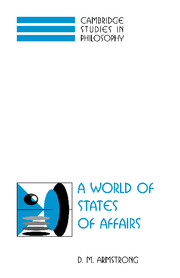Book contents
- Frontmatter
- Contents
- Preface
- 1 Introduction
- 2 Some preliminary doctrines
- 3 Properties I
- 4 Properties II
- 5 Powers and dispositions
- 6 Relations
- 7 Particulars
- 8 States of affairs
- 9 Independence
- 10 Modality
- 11 Number
- 12 Classes
- 13 Totality states of affairs
- 14 Singular causation
- 15 Laws I
- 16 Laws II
- 17 The unity of the world
- References
- Index
2 - Some preliminary doctrines
Published online by Cambridge University Press: 03 February 2010
- Frontmatter
- Contents
- Preface
- 1 Introduction
- 2 Some preliminary doctrines
- 3 Properties I
- 4 Properties II
- 5 Powers and dispositions
- 6 Relations
- 7 Particulars
- 8 States of affairs
- 9 Independence
- 10 Modality
- 11 Number
- 12 Classes
- 13 Totality states of affairs
- 14 Singular causation
- 15 Laws I
- 16 Laws II
- 17 The unity of the world
- References
- Index
Summary
This chapter will put forward a number of theses which, though of great importance for the course of the subsequent argument, are in great degree independent of the metaphysic of states of affairs.
SUPERVENIENCE
Definition of supervenience
We shall say that entity Q supervenes upon entity P if and only if it is impossible that P should exist and Q not exist, where P is possible. Impossibility here is the strongest or absolute impossibility, the sense in which (most philosophers would say) it is impossible that 7 + 5 should equal 11. Possibility is the weakest possibility, the possibility, for instance, that the Earth and its inhabitants do not exist.
A number of contemporary philosophers give definitions of supervenience in terms of properties, though usually taking a relaxed view of what a property is. For our purposes here, it is convenient not to restrict the scope of our definition in any way. Hence the use of the term ‘entity’. There are other contemporaries who think that talk of supervenience has led to mere muddying of the waters. It may perhaps help to point out that supervenience in my sense amounts to entity P entailing the existence of entity Q, but with the entailment restricted to the cases where P is possible.
It is also convenient, because comfortable to the human intellect which handles extensions more easily than intensions, to define supervenience in terms of possible worlds.
- Type
- Chapter
- Information
- A World of States of Affairs , pp. 11 - 18Publisher: Cambridge University PressPrint publication year: 1997



